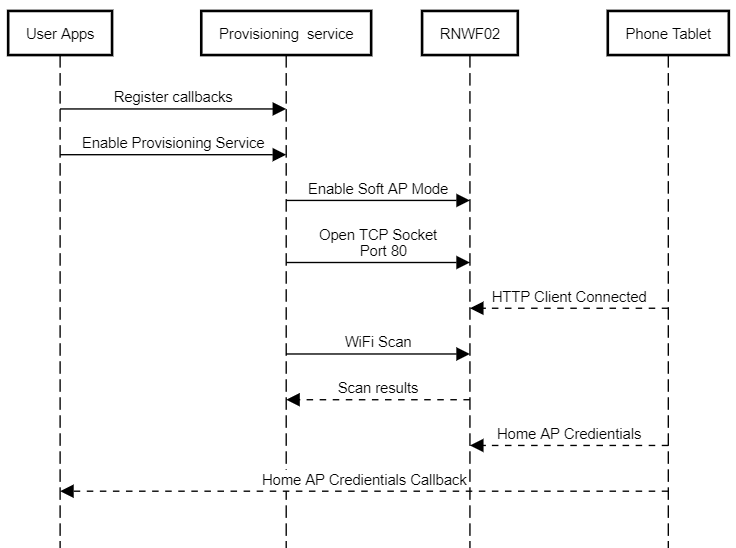3.2.8.4 Provisioning Service
The provisioning service helps to configure the Wi-Fi interface credentials. It
supports TCP tunnel and Web server based provisioning services. It implements or handles
all the required AT commands to start the module in Access Point mode and open up a TCP
tunnel or serve a HTML web page to receive the Wi-Fi credentials. The provisioning
service call API syntax is provided below:
SYS_RNWF_RESULT_t SYS_RNWF_PROV_SrvCtrl(SYS_RNWF_PROV_SERVICE_t request, void *input)Provisioning Service Configuration in MCC
The provisioning service provides the following options for the user:
The following list captures the provisioning service callback event codes and
their arguments
| Options | Inputs | Remarks |
|---|---|---|
SYS_RNWF_PROV_ENABLE |
None | Enables the provisioning service |
SYS_RNWF_PROV_DISABLE |
None | Disables the provisioning service |
SYS_RNWF_PROV_SET_CALLBACK |
Callback handler | Registers the application callback function to report the provisioning status |
| Event | Response Components | Remarks |
|---|---|---|
SYS_RNWF_PROV_COMPLTE |
Mode, SSID, Passphrase, Security, Autoenable | Provisioning complete and returns the provisioned Access Point credentials. User application can store it securely for auto reconnection on every boot up |
SYS_RNWF_PROV_FAILURE |
None | Provisioning failure |
The provisioning service sequence is provided below:Figure 3-80. Provisioning Service
Sequence


Following example code showcases the use of provisioning service
/*
Provisioning application
*/
/* Application Wifi Callback Handler function */
static void SYS_RNWF_WIFI_CallbackHandler ( SYS_RNWF_WIFI_EVENT_t event, uint8_t *p_str)
{
switch(event)
{
/* Wi-Fi connected event code*/
case SYS_RNWF_CONNECTED:
{
SYS_CONSOLE_PRINT("Wi-Fi Connected \r\n");
break;
}
/* Wi-Fi disconnected event code*/
case SYS_RNWF_DISCONNECTED:
{
SYS_CONSOLE_PRINT("Wi-Fi Disconnected\nReconnecting... \r\n");
SYS_RNWF_WIFI_SrvCtrl(SYS_RNWF_STA_CONNECT, NULL);
break;
}
/* Wi-Fi DHCP complete event code*/
case SYS_RNWF_DHCP_DONE:
{
SYS_CONSOLE_PRINT("DHCP IP:%s\r\n", &p_str[2]);
break;
}
default:
{
break;
}
}
}
/* Application Wifi Provision Callback handler */
static void SYS_RNWF_WIFIPROV_CallbackHandler ( SYS_RNWF_PROV_EVENT_t event, uint8_t *p_str)
{
switch(event)
{
/**<Provisionging complete*/
case SYS_RNWF_PROV_COMPLTE:
{
SYS_RNWF_PROV_SrvCtrl(SYS_RNWF_PROV_DISABLE, NULL);
SYS_RNWF_WIFI_SrvCtrl(SYS_RNWF_WIFI_SET_CALLBACK, SYS_RNWF_WIFI_CallbackHandler);
// Application can save the configuration in NVM
SYS_RNWF_WIFI_SrvCtrl(SYS_RNWF_SET_WIFI_PARAMS, (void *)p_str);
break;
}
/**<Provisionging Failure*/
case SYS_RNWF_PROV_FAILURE:
{
break;
}
default:
{
break;
}
}
}
/* Application Initialization function */
void APP_Initialize ( void )
{
/* Place the App state machine in its initial state. */
g_appData.state = APP_STATE_INITIALIZE;
}
/* Maintain the application's state machine. */
void APP_Tasks ( void )
{
switch(g_appData.state)
{
/* Application's state machine's initial state. */
case APP_STATE_INITIALIZE:
{
DMAC_ChannelCallbackRegister(DMAC_CHANNEL_0, APP_RNWF_usartDmaChannelHandler, 0);
SYS_RNWF_IF_Init();
g_appData.state = APP_STATE_REGISTER_CALLBACK;
break;
}
/* Register the necessary callbacks */
case APP_STATE_REGISTER_CALLBACK:
{
uint8_t certList[512];
SYS_RNWF_SYSTEM_SrvCtrl(SYS_RNWF_SYSTEM_GET_CERT_LIST, certList);
SYS_CONSOLE_PRINT("%s\n", certList);
// Enable Provisioning Mode
SYS_RNWF_PROV_SrvCtrl(SYS_RNWF_PROV_ENABLE, NULL);
SYS_RNWF_PROV_SrvCtrl(SYS_RNWF_PROV_SET_CALLBACK, (void *)SYS_RNWF_WIFIPROV_CallbackHandler);
g_appData.state = APP_STATE_TASK;
break;
}
/* Run Event handler */
case APP_STATE_TASK:
{
SYS_RNWF_IF_EventHandler();
break;
}
default:
{
break;
}
}
}
